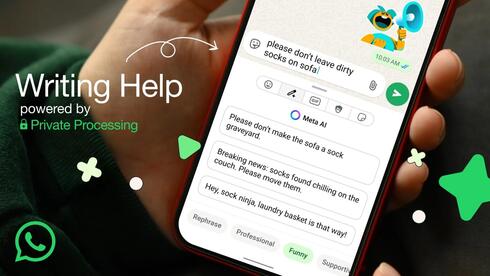WhatsApp on Wednesday launched a new artificial intelligence tool called “Writing Help,” designed to make message writing clearer, more professional and easier to compose directly within the app.
The feature allows users to type a message, tap a pencil-shaped icon, and receive suggestions to improve tone, style or clarity—similar to tools like ChatGPT, but integrated into WhatsApp itself.
According to Meta, the tool relies on a proprietary technology called “Private Processing,” which encrypts user requests and sends them anonymously to Meta’s servers. The company says that neither WhatsApp, Meta nor any third party can access or store the content of the messages. Suggestions are returned to the user’s device without leaving a digital trace.
Meta emphasized that no data is stored on its servers, and neither the original messages nor the AI-generated suggestions can be linked to a specific user or read by company employees. To use the feature, users must first activate Private Processing in their app settings. Once enabled, a pencil icon appears next to the text input field. The tool only processes a message after the user taps the icon.
Users can choose from several rewriting styles, including professional, humorous, supportive or error correction. The assistant generates different versions of the message, allowing the user to keep the original or adopt a suggested version. Recipients do not see whether a message was rewritten using the tool.
The new feature reflects WhatsApp’s growing role beyond personal messaging. With many using the app for business, including via WhatsApp Business, Meta aims to help users sound more professional—especially in conversations conducted in non-native languages—or quickly correct typos and grammar mistakes.
Initially tested with a small group of users, the tool is now officially rolling out in English to Android and iOS users in the United States and other countries. Meta plans to expand support to more languages and regions later this year. For now, however, users in Israel will have to wait, as there is no announced launch date for Hebrew or local availability.
With this launch, Meta joins companies like Telegram, Microsoft and Google in integrating AI writing tools into messaging apps, while attempting to maintain user trust and privacy. If successful and expanded globally, the tool could mark a shift in how users compose everyday messages.

